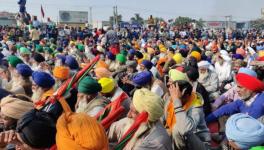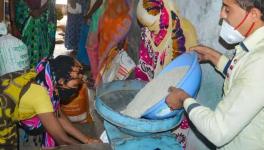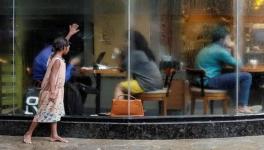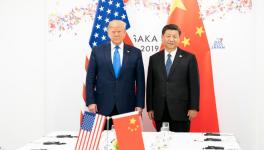WTO: India Betrayed the Farmers
Newsclick interviewed Dinesh Abrol, convener of 'Indian People's Campaign Against WTO' on the affairs concerned to 10th WTO Ministerial Conference concluded recently in Nairobi. He said, World Trade Organisation is a platform to implement the agenda of developed nations, especially United States. Although, India has the privilege to negotiate the discussions in the WTO, but the present BJP government has not taken any firm stand to protect the domestic farmers, inspite of the steep rise in farmer suicides. India deviated from the earlier Bali and Doha round of discussions. In Abrol's words, India followed US in the Nairobi discussions. Through the agreements in WTO, developed nations influence the macro level policies of the third world nations, US opposed the subsidies provided to the farmers by the Indian government but at the same time, US government provides subsidies to the farmers in US. This is strengthening the export of US goods and dumping the same in the developing nations like India. There was no word on food and farmer security measures for the people in third world countries, in the summit held.
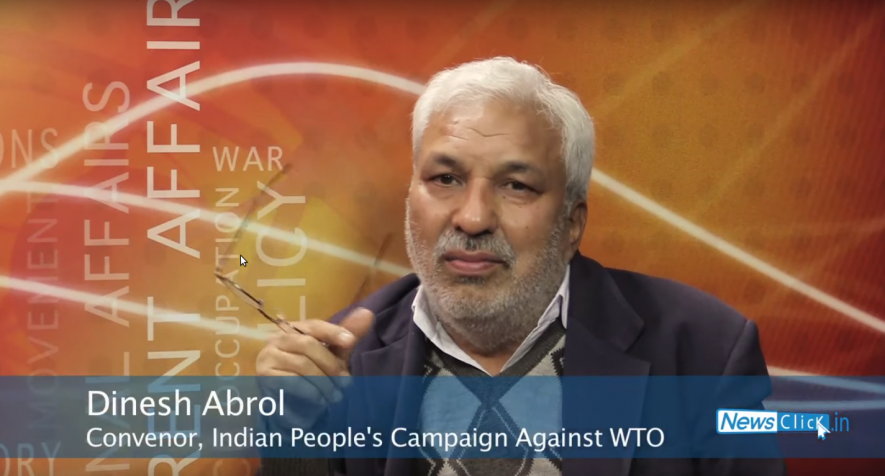
Rough Transcript:
Prabir Purkayastha (PP): Hello and welcome to Newsclick. Today, we are going to discuss the Nairobi declaration of WTO. The US and the European Union has declared victory, the Indian side says that this is not true that we still have the Doha round alive. To discuss the implications of what the Nairobi declaration are we have Dinesh Abrol who has been following WTO negotiations for a long time in fact, was one of the main commentators as well as a campaigner against the TRIPS agreement which were started in WTO. Dinesh, good to have you with us. What do you think is the truth behind what our commerce minister is saying that we have not lost anything in Doha round.
Dinesh Abrol (DA): The minister of commerce from India has tired claiming that it is she who has secured let us say in agriculture the special safeguard mechanism which is actually protects you against the import surges whenever you import go up you should have a right to increase your tariff. Now this particular agreement was worked out in Hongkong ministry that was in 2005. to claim that she has secured this in fact what we see at the moment in work programme it's infinite postponement of the discussion on special safeguard mechanism
PP: So can you explain what the peace clause is to the audience?
DA: In Bali in 2013 on the public food subsidy programme the UPA government the commerce minister of then Mr. Anand Sharma has secured a four year moratorium which would have ended on 2017. Now, India has been bilaterally negotiating with US and you know the Modi's forays and Nirmala Sitharaman's joint working group on trade with US etc has been discussing. So bilaterally they have secured till a permanent solution is worked out, a moratorium would be there. India would not be dragged into the dispute settlement mechanism.
PP: That was one of the interpretations of that 2013 clause also that by 2017, there would be a permanent solution pending which what would happen is not clear.
DA: Whatever she obtained event through in terms of clarification was obtained by bilateral deal. Not through multilaterally. Many of the developing countries who were the part of it UPA has built at that particular part of time began to collapse and we did not have the support of that paricular coalition on the public food subsidy programme at Nairobi. See that point is worth noting because this is the kind of damage that strategy of going close to the US rather than building the unity of the south to which we were attempting earlier is really going to prove very costly I don't it's going to be a small error. If you look at similarly on the special safeguard mechanism as you were saying, a similar kind of infinement postponement has occurred.
PP: Dinesh again, special safeguard mechanism can you explain what it is?
DA: Basically, when the imports go up, upsurges are there then you should have the right to protect yourself against those imports because that can damage your livelihood farmer. You want protection through increasing the import tariffs and as a result you would be able to protect your own farmers in terms of what prices at which they would be able to sell so on and etc. they won't have to sell at the lower price they won't have to dump. The dumping has been take place from outside. Particularly, US subsidizes their food grains quite a lot.
PP: That's the second set of issues while we are supposed to phase out all export subsidies by a certain date 2020, 2023. point is that the US and it's own subsidies as well as European Union subsidies are outside this. So they will continue.
DA: There are two types of subsidies there also. One set of subsidies are the one which are called the domestic subsidies you know there were three boxes a green box, amber box and so on. Now, US has put all it's subsidies in green box, that's one set of subsidies. There were also export subsidies. The clever thing that the US has done is that it has protected it's export credits so it is going to be able to subsidize. So even export competition related subsidies are not totally eliminated. But the big issues that other countries has raised including India was that export subsidy is one part but your total subsidies have come down and we have to have potential to safeguard against hunger which is what public distribution system is. These are the two issues which we seem to have got no where on the subsidies of the rich.
DA: If you remember when Pranab Mukherjee piloted an Marakkesh agreement through WTO came into existence. One of the benefit that Pranab argue that we are agriculturally very proficient, rich nation and it is being promised that subsidies would be brought down by the countries and as result we would be able to actually become competitive and agriculture would be a major area where farmers would benefit and another member and Nanjudaswamy and we also met actually planning commission this was one of the major claim that he made and but we see over the period the way the fine print of that particular agreement and I just as suggested that the subsidies rather than decreasing rather than actually going and it was the responsibility since of that who were now you know charged of the responsibility like Indian government. They should have protected the GDA.
PP: The major issues that the third world or the developing countries has been on the table but no progress in terms of actual negotiations while trade facilitations which was only interest of developed countries that's only one which through and now it appears that the Doha development round is as far as US and EU are concerned they are saying it off the table.
DA: Let me pick up the issue which you raised with regard to trade facilitation agreement. See this was the only bargaining chip that we have, it is only the leverage point that we have. We lost that in November 2014 by signing the protocol. With me in the DFA, got incorporated to the annex one of the WTO which we should not have done. This Modi government again did it. Whereas UPA at that time though UPA did many many wrong things as far as this no doubt about that. But they linked it to the question of permanent solution on the public food subsidy programme DFA, but here is the government very eager to actually collaborate with the US and US terms as far as concerned did not use the bargaining chip. See issue with not only this bargaining chip export competition could have been equally bargaining chip because the US and EU are kind to rationalize their subsidy structure. So that conflict is also there as far as this is concerned. We could have again like earlier we have used this competition between two imperialist power to such major economies like in TRIPS we have used it. In fact, article 27.3 we can discuss it separately that's how the bio-technology directive as it was not ready in the European Union that we got certain protection in case of biologics plant varieties and so on etc. patenting of the plant was not possible at that time, EU was not ready. So that contradiction was exploited. Today also the export completion area there was also a possibility again to hold back. DFA was of course a bigger chip but even export competition we could have said we are not willing to leave this bargaining chip with you. You are not agreeing to our agenda. Now, I am coming to Doha development agenda issues which you have persistently wanting to explore. I think it is an important issue, a very very important issue. What will happen to the Doha development agenda. The final declaration as it has emerged now it is very very clear that they are not mentioning Doha round issues, Doha development issues. They are mentioning as Doha issues. We also see in those paras of accommodations that many want Doha issues to be discussed. It is still not Doha development issues. Doha issues also got many you know..But they have inserted in the para saying some do not agree to it. So many are being equated with some as far as concerned. As a result for a moment now the battle will go to Geneva there and what kind of unity we are able to build that would determines finally whether any of the Doha issues can be resurrected or not. As far as US is concerned EU is concerned they are very very clear.
PP: That's the bigger problem. Not only it is debt, the issues that were concerning the developing countries but you have opened the window or open the crack in the door for other issues which are interest to them. So they got what they wanted the trade facilitation, they did not get what they wanted and now we are on board apparently for abetting new issues.
DA: Before we even take up those two points. See, we legally and politically stood firm in Singapore. In the ministerial conference immediately after the Uruguay round if you remember that particular thing where the Marrakesh agreement for the first time would be extended to new issues. Investment, procurement, environment, labour, competition law. All these issues are important to the global structure of the trade as it is the part of the global value chain. So these issues were brought in 1996 only they got unilateral agreement in information and technology, they have disseminated our industry. So we stood firm on that particular point of time. But today, if you look at these fellows I do not know whether they even understand what are the implications are fully. This is a tofally new team brought from Gujarat, you know Modi's love for Gujarat bureaucrats whether they know anything about the subject or not and in most of the cases we find that they do not know the issue. The team is totally new and they probably they were happy to be on the high table in Nairobi. They thought that they have won the world that way as far as this is concerned. Here, legally they had a right that's the point which I want to emphasis that in Nairobi that India had there in the green room or outside, I would have said that that is legal right of India that India did not exercise the particular legal right.
PP: We could have stood firm in Doha, we could have stopped this from going forward. There is now way if India would have stood firm as you said would have completed in this particular form that has. Whether we would be able to regain we will see and watch with you what happens in the future in WTO negotiations.
DISCLAIMER: Please note that transcripts for Newsclick are typed from a recording of the program. Newsclick cannot guarantee their complete accuracy.
Get the latest reports & analysis with people's perspective on Protests, movements & deep analytical videos, discussions of the current affairs in your Telegram app. Subscribe to NewsClick's Telegram channel & get Real-Time updates on stories, as they get published on our website.











